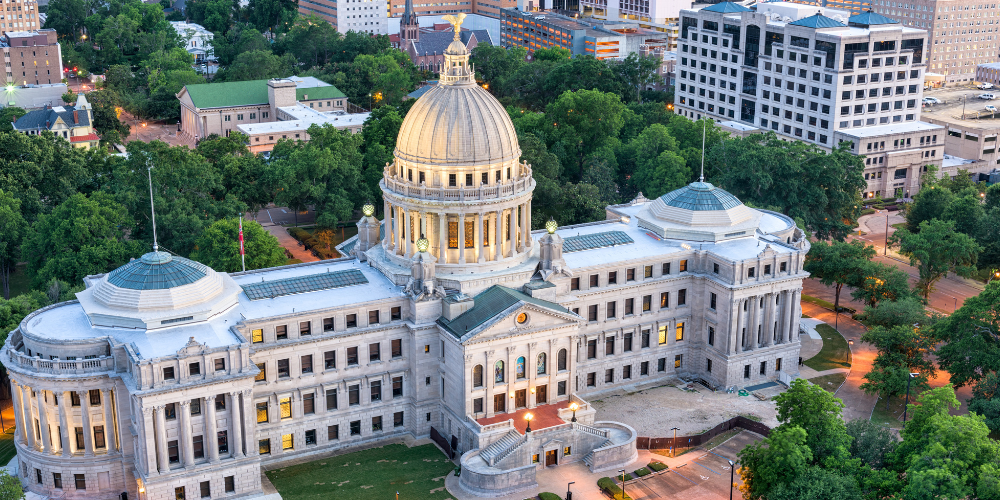Committee
Universities and Colleges; Appropriations
Author
Rita Potts Parks
Session
2023 Session
Latest Action
On April 19, the Governor signed SB 2487 into law. It will take effect on July 1, 2023.
Explanation of the Bill
Senate Bill 2487 would create the Mississippi Dual Enrollment/Dual Credit Scholarship Program, which would provide funding for high school students to enroll in dual enrollment or dual credit courses.1
Mississippi Dual Enrollment/DualCredit Scholarship Program
Institutional Requirements
Any public or not-for-profit postsecondary educational institution could choose to offer courses to students through the Mississippi Dual Enrollment/Dual Credit Scholarship Program. Participating institutions would be reimbursed at 40% of the average community college credit hour tuition cost for the current year. It is unclear whether the institutions would be agreeing to accept this lower tuition amount by choosing to participate in the program, or if students/school districts would be responsible for covering the remaining tuition amount.
Only courses on the “Approved Academic Dual Credit Listing” in the manual for the State of Mississippi Dual Enrollment and Accelerated Programs would be eligible for funding.
Student Requirements
Students enrolled in grades 11 and 12 at traditional public schools and public charter schools would be eligible to complete courses through the scholarship program. However, early college students would not be eligible.
Participating students could receive funding for a maximum of six dual-credit hours. They would be required to participate in an advising component to ensure understanding of the credit transfer process.
Funding
In order to operate, the program would require a specific appropriation from the Legislature. During the 2023 Legislative Session, the Legislature appropriated nearly ten million dollars for the program.
1 Dual-enrolled students differ from dual-credit students in that they only receive college credit for postsecondary courses. In contrast, dual-credit students receive high school and college credit for postsecondary courses. SB 2487 mistakenly reports that the definition of a dual-enrolled student is described in Code Section 37-15-37(1)(a). This should be revised to note the location of the definition as Code Section 37-15-38(1)(a).
| Date | Details |
|---|---|
| 1/16/23 | On January 16, SB 2487 was referred to the Senate Universities and Colleges Committee and Senate Appropriations Committee. |
| 1/25/23 | On January 25, the Senate Universities and Colleges Committee passed a committee substitute of SB 2487. |
| 1/31/23 | On January 31, the Senate Appropriations Committee passed a different committee substitute of SB 2487, sending it back to the Senate Universities and Colleges Committee. The Senate Universities and Colleges Committee passed the new committee substitute. |
| 2/8/23 | On February 8, the Senate passed SB 2487. |
| 2/13/23 | On February 13, SB 2487 was referred to the House Universities and Colleges Committee and House Appropriations Committee. |
| 2/22/23 | On February 22, the House Universities and Colleges Committees amended and passed SB 2487. |
| 2/28/23 | On February 28, the House Appropriations Committee amended and passed SB 2487, sending it back to the House Universities and Colleges Committee, which passed the new amended version of the bill. |
| 3/7/23 | On March 7, the House passed the amended version of SB 2487. |
| 3/14/23 | On March 14, the Senate invited conference on SB 2487. Senate conferees include Rita Potts Parks, Briggs Hopson, and Dennis DeBar. House conferees include Donnie Scoggin, Kent McCarty, and Manly Barton. |
| 3/27/23 | On March 27, House and Senate conferees filed a conference report for SB 2487 that removes the House amendment to the bill. |
| 3/28/23 | On March 28, SB 2487 was recommitted for further conference. House and Senate conferees filed a second conference report that extends program eligibility to dual enrollment students (in addition to dual credit students). It also allows students to receive funding for up to nine dual credit/dual enrollment hours (the original bill allowed students to receive funding for up to fifteen hours). |
| 3/29/23 | On March 29, SB 2487 was recommitted for further conference. House and Senate conferees filed a third conference report. Like the previous conference report, the newest version extends program eligibility to dual enrollment students. Unlike the previous conference report, it only funds up to six dual credit/dual enrollment hours. |
| 3/30/23 | On March 30, the House and Senate approved the conference report for SB 2487. The bill is awaiting the Governor’s signature. |
| 4/19/23 | On April 19, the Governor signed SB 2487 into law. It will take effect on July 1, 2023. |

